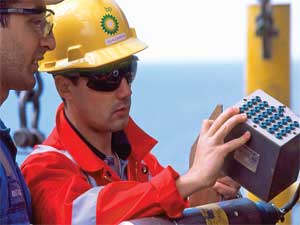INDUSTRY RECRUITMENT & RETENTION
BP offers graduates, new hires a complete career “experience”
An early-career professional describes how one major oil and gas company serves as a model for taking a pro-active approach to recruiting new talent that it needs for the next several decades.
Ira Kempf, BP Exploration & Production, Inc., Houston
What a great time to be a new college graduate! In the wake of higher energy prices and the industry “generation gap,” demand for new recruits has soared. In the past, multiple offers from major companies were only received by elite students—those at the top of their class from highly acclaimed programs. Now, it seems that most engineering graduates receive multiple offers from companies willing to compete for their services. So how does BP recruit the brightest and best talent in such a competitive market?
Beyond the money. Of course, receiving a competitive salary is the bottom line for most students. However, now that signing bonuses have become the norm, companies must find other ways to attract new talent. BP’s creative solution is to not just offer their E&P graduates “jobs” with competitive salaries. Rather, the company offers a development “experience,” complete with challenging career rotations and formalized training and networking, along with a work-life balance mentality. All of this is very neatly wrapped up in a program known as BP’s E&P Challenge Program.
Taking the “Challenge.” Many companies offer training and early development programs, but the BP Challenge’s highly structured, technical and personal development schedule aimed at developing key skills and competencies, together with subsidized networking events, makes it a truly unique development experience. The suggested three-year program offers year-long job rotations and exclusive, internal structured core and cross-discipline training courses. Graduation is based on a competency assessment where yearly job rotations are assigned to bridge deficiencies. The three year-long rotations must include one field assignment and may include an international posting. Each “Challenger” is also assigned a technical coach and separate career mentor, along with a “Challenge Buddy.” Finally, regular BP-sponsored networking events are specifically designed to help the new graduate form networks and contacts within the Challenge and BP Global Communities.
 |
BP�s young E&P professionals are encouraged to add to their backgrounds by engaging in challenging work rotations.
|
|
The 200 US-based Challengers are of extremely diverse backgrounds, with people of different ethnic groups, education, genders and ages represented. The diversity of the Challenge population helps to enhance the development experience and is a reflection of BP’s commitment to recruit from a variety of engineering and geoscience programs. In fact, current Challengers help to recruit future Challengers. After all, who better to sell an early development “experience,” than those who are going through it themselves?
In addition, new recruits are attracted to BP’s work-life balance philosophy. This includes flexible work day schedules, a 9-day/80-hr two-week work schedule, casual dress, on-site day care and a wellness center staffed with personal trainers.
The Challenge program is not confined to the US. BP also runs a number of country-specific Challenge programs to support high-potential individuals. In Angola, 41 graduates with less than three years of work experience entered the Challenge program in 2005, working with discipline coordinators to develop specific skills. In Egypt, where the company anticipates that the number of graduates required in its fast-growing gas production business will rise substantially to around 600 by 2010, the firm has created a staged development program. Graduates join the program on a two-month internship, from which Challenge participants are selected. As part of a similar program run in Trinidad & Tobago, 11 high-potential engineers and geoscientists undertook specialist studies in 2005, attending universities in the West Indies, the US and the UK.
Companies should not compromise hiring standards in this competitive recruiting market. However, they must be flexible and recruit from a vast portfolio of engineering programs (including smaller and lesser-known schools), and look beyond the traditional engineering majors. By offering competitive salaries, development programs and work-life balance, energy companies should be able to successfully recruit and retain top talent for many years to come. BP’s Recruiting and Global Challenge Program is detailed at: www.bp.com/careers/us. 
|
THE AUTHOR
|
|
Ira Kempf was recruited by BP in 2005 after graduating from Texas A&M University (Galveston). She holds a degree in Maritime Engineering and has been working as a subsea engineer for BP Deepwater GOM. Her job experience under the Challenge development program includes two rotations in the deepwater GOM, where she has been responsible for planning and executing subsea hardware and controls installations, as well as, subsea equipment delivery. She currently holds several leadership positions within the BP Challenge organization and the Houston professional community, and is a member of the Next Generation Committee of the World Oil Awards.
|
|
|



